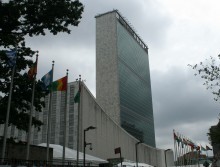
On Wednesday at the United Nations Security Council, Russia vetoed Israel’s right to self-defense—or at least the UN’s endorsement of that right. While the Israel-Hamas war rages on, the UN’s most powerful council remained stalemated in its efforts to put together a humanitarian resolution covering the conflict. Israel’s right to respond in self-defense, after Hamas massacred more than 1,400 Israelis—mostly civilians—and kidnapped over 220 more, is a key reason for the diplomatic crisis.
Israeli Ambassador to the United Nations Gilad Erdan at the Security Council meeting highlighted the hypocrisy of nations who are opposed to Israel’s actions in the face of one of the worst terror attacks in modern history. “If any of your countries endured a similar massacre, I am certain—certain—that you would act with much greater force than Israel. Much greater force,” said Erdan in a video of his comments posted to his feed on X, formerly Twitter.
“There would be no question in your minds that such a barbaric slaughter requires a broad military operation against the terrorists who committed such inhumane atrocities to eradicate their terroristic capabilities, in order to make sure such atrocities can never happen again.”
One week after vetoing a separate UN Security Council resolution because it did not include a provision on Israel’s rights, the United States put forth a new statement at the international body this week calling for a humanitarian ceasefire aimed at getting aid to Gaza civilians. 10 of the Security Council’s 15 members voted to approve the resolution, which included language noting a nation’s inherent right to self-defense, according to the UN News report on the vote. However, Russia—one of five nations with veto powers on the Council—joined with China to nix the American-sponsored resolution.
Among the various reasons for the veto, Russian Permanent Representative to the UN Vassily Nebenzia specifically highlighted the national self-defense clause. In comments published to his office’s website, the Russian ambassador claimed that Israel occupies the “Palestinian territories” and cited a legal perspective that “the right to self-defense is inapplicable in the case of an occupying power”. In effect, that means that Russia believes Israel could never defend itself against Palestinian terrorism—although the Russian Embassy to Israel would later claim on X that they never denied Israel’s right to defense against terrorism.
Russia is a key ally of the Iranian regime that sponsors the Hamas terrorist organization, with Iran providing Russia military drones in the latter’s illegal invasion of Ukraine.
While Nebenzia noted other reasons for his objection to the UN resolution—including calling for an immediate ceasefire—the Israel self-defense clause was highlighted further when Russia put forth its own UN resolution on Gaza. The UN News report noted the US and Russian-led resolutions were similar, with the article highlighting as the main differences the self-defense component and a Russian call for Israel to terminate its call for civilians to flee northern Gaza ahead of a ground invasion.
US Ambassador to the UN Linda Thomas-Greenfield was “deeply disappointed” at the Russian veto. In comments published by her office, she called the Russian move to veto the US resolution and then hastily put forth its own UN vote “cynical and irresponsible.” She noted the Russian text “contains a number of problematic sections.”
Erdan noted in the video of his comments at the Security Council the ongoing Palestinian rocket attacks on civilians, including his own parents. Said Erdan to the Council, “You cannot condemn even these deliberate attacks on civilians perpetrated by terror organizations.”
Erdan separately thanked the Americans for their support in another post to his X account, translated from Hebrew by Google. “A significant achievement for the United States in the Security Council. 10 of the 15 council members have now voted in favor of her proposal, which unfortunately was blocked by a Russian and Chinese veto. Thank you from the bottom of my heart to the United States.”
It wasn’t the first time Erdan had thanked the US during the current conflict. Previously, he expressed his appreciation on X after the US vetoed the prior Security Council resolution from Brazil. Thomas-Greenfield had highlighted the importance of affirming Israel’s right to self-defense in explanation of her vote at the time, which was also published by her office.
“Like every nation in the world, Israel has the inherent right of self-defense, as reflected in Article 51 of the UN Charter. Following previous terrorist attacks by groups such as al-Qaida and ISIS, this Council reaffirmed that right,” said Thomas-Greenfield about the October 18 vote on the Brazil-sponsored resolution. “This text should have done the same.”
Amid the stark debate about Israel’s right to self-defense, the potential success for a UN-sponsored humanitarian effort remains uncertain. The UN has a troubled history in addressing Israel-Arab conflict, including the utter failure of UN peacekeepers in Lebanon to prevent the Second Lebanon War and Hezbollah’s ongoing armament.
Meanwhile, Erdan this week further exposed Hamas as creating a humanitarian crisis in Gaza. In another post to X, Erdan wrote: “We know for sure that there’s plenty of fuel in Gaza. Hamas has stored fuel in advance, and is stealing fuel from both civilians and the @UN, to power its war machine against Israel.
“When will the world hold Hamas accountable for its crimes against humanity and against the people of Gaza? When will the UN understand that they are empowering Hamas’ terror regime by not holding them accountable?”
(By Joshua Spurlock, www.themideastupdate.com, October 26, 2023)
